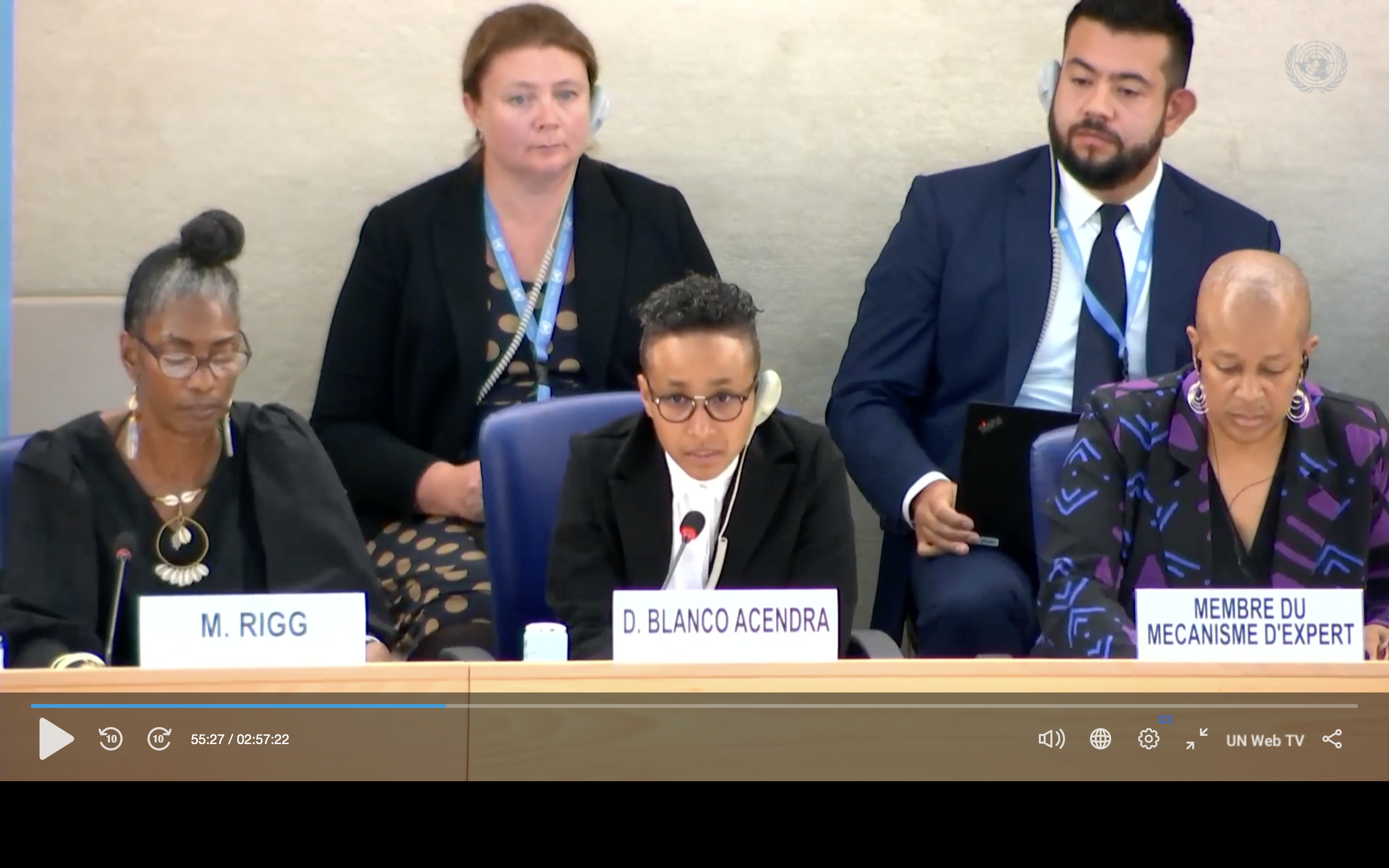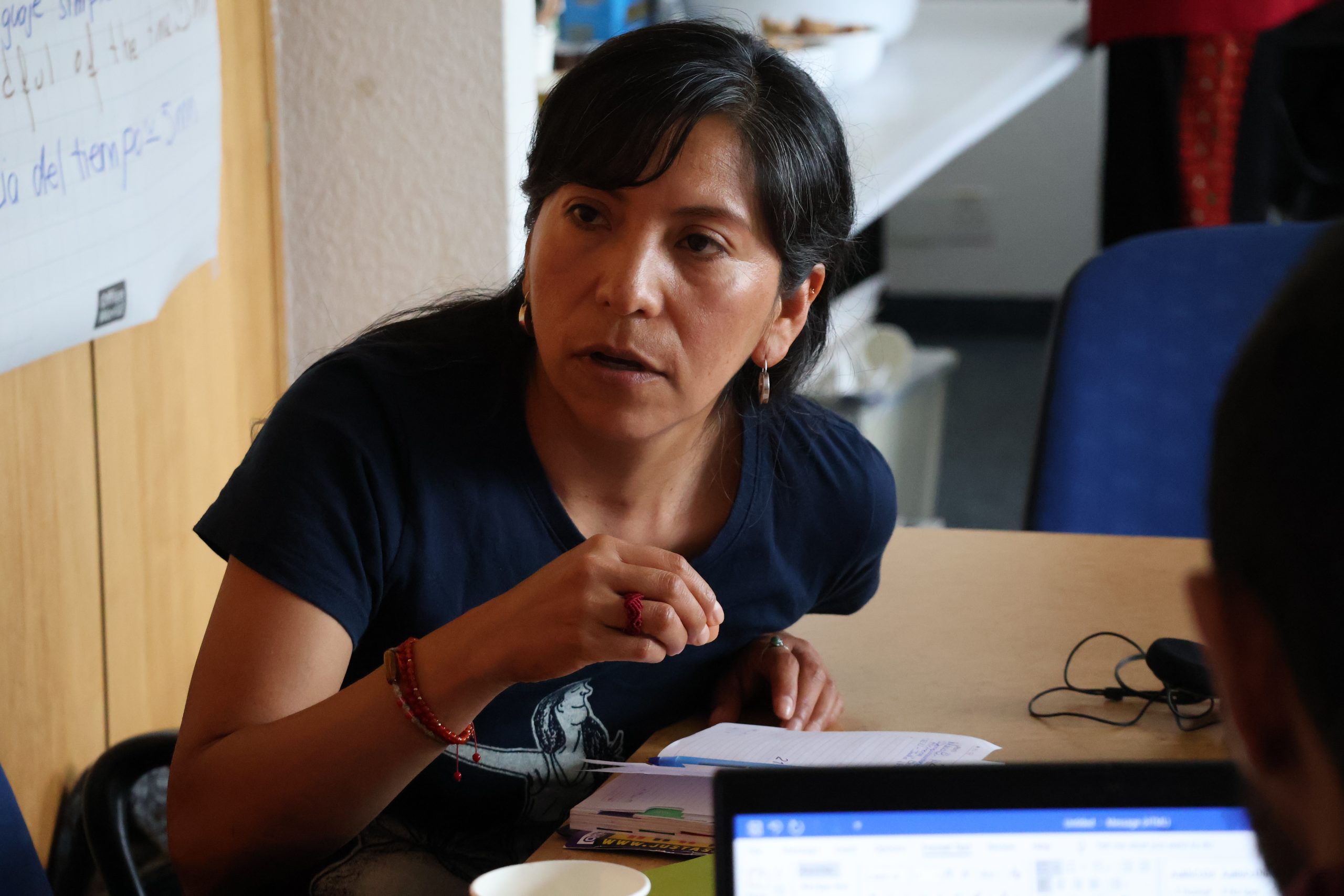
Egypt: Reform unjust vice laws, guarantee open civic space
During Egypt's UPR adoption at HRC59, Nora Noralla delivered a joint statement on behalf of ISHR, Cairo 52 and Middle East Democracy Center. Watch and read the full statement below.
Photo: UN WebTV. Marcia Riggs, Dayana Blanco (ILEX), and Dr. Tracie Keessee (EMLER) during the 38th meeting at HRC54.

On 5 October, State representatives, civil society organisations, the Office of the High Commissioner for Human Rights (OHCHR) and the Expert Mechanism to Advance Racial Justice and Equality in the Context of Law Enforcement (EMLER) came together to discuss the worldwide situation of racism against Africans and People of African Descent.
Highlighting the key annual reports by OHCHR focused on Transformative Change for Racial Justice and Equality and Re-Imagining Policing by EMLER, the debate featured the participation of two members of the UN Antiracism Coalition (UNARC), Dayana Blanco, director of Ilex Acción Jurídica (Colombia), and Marcia Riggs (United Kingdom), the directly impacted sister of Sean Riggs who has been advocating for justice ever since her brother died following excessive restraint by four UK Metropolitan police officers in 2008.
During the debate, civil society organisations and OHCHR as well as EMLER underlined the anti-Blackness human rights violations, and the importance of meaningful participation, inclusiveness and promotion of good practices in order to fight systemic racism rooted in colonialism and the transatlantic slave trade. Dayanna Blanco emphasised the important approach of both reports on ‘…highlighting the need for States to commit to consolidate and publicise disaggregated data based on ethnic and race origins’ and finalised her statement calling the UN to establish independent mechanisms to investigate and punish violence against Black people. Marcia Riggs said: ‘Over the past 15 years, my campaign has been my life’s work. This has been with great cost but I will continue this fight for our freedom.’
ISHR and UNARC also delivered a joint statement during the debate. More information about the reports is available on our press release, here. You can find the video and the full version of the joint statement delivered by Nayara Khaly Silva Sanfo, UNARC fellow at ISHR, below:
Thank you, President. This is a joint statement.
We, the United Nations Antiracism Coalition (UNARC), recall the High Commissioner’s agenda for transformative change for racial justice and equality, and urge all States to:
Relentlessly, grassroots organisations around the world continue working for racial justice despite the daily challenges imposed by systemic racism, legacies of colonialism, and the transatlantic trade of enslaved Africans. We strongly encourage the United Nations (UN) mechanisms working on racism to maintain the current opportunities for people of African descent to expose challenges and propose local-based and global solutions, as the work developed by the Expert Mechanism to Advance Racial Justice and Equality in Law Enforcement (EMLER) during their country and regional visits.
We welcome EMLER’s annual reports, in particular regarding:
We appreciate the experts’ inclusive consultations with civil society, including the regional visit to Chile in 2022, but regret that the report did not go into depth on the situation in Latin America as presented by civil society during the audiences. We are appalled by the reality of Afro-descendants in Brazil where 6,000 people are killed by the police per year and 83 percent of them are Black, and 76 percent are aged between 12 and 29, and we look forward to the mechanism’s upcoming visit to the country. We also appreciate the inclusion of an annex on the United States (U.S.) visit report with the names of directly impacted people who gave their testimonies to the experts.
Our efforts regarding transformative change need to be centered on building safe, participatory spaces where Africans and Afro-descendants can safely share their narratives without becoming more vulnerable to reprisals including death. Human rights defenders are the experts working on the ground, demanding that States uphold their obligations and that the UN has an important role in pushing for change. But solid transformation can only be achieved when States garner the political will to implement their obligations, including by ensuring participation and representation of people of African descent, particularly women and youth, at every level in State institutions and policy-making processes.
Download as PDF
During Egypt's UPR adoption at HRC59, Nora Noralla delivered a joint statement on behalf of ISHR, Cairo 52 and Middle East Democracy Center. Watch and read the full statement below.

At the Human Rights Council, Belgium delivered a statement on behalf of over 60 States that 'pays tribute to the numerous achievements and meaningful progress made by women and girls human rights defenders, and emphasises the continued need for their voices to be heard and supported'.

The 59th session of the UN Human Rights Council (16 June to 9 July 2025) will consider issues including civil society space, climate change, sexual orientation and gender identity, violence and discrimination against women and girls, poverty, peaceful assembly and association, and freedom of expression, among others. It will also present an opportunity to address grave human rights situations including in Afghanistan, Belarus, China, Eritrea, Israel and oPt, Sudan, Syria and Venezuela, among many others. Here’s an overview of some of the key issues on the agenda.